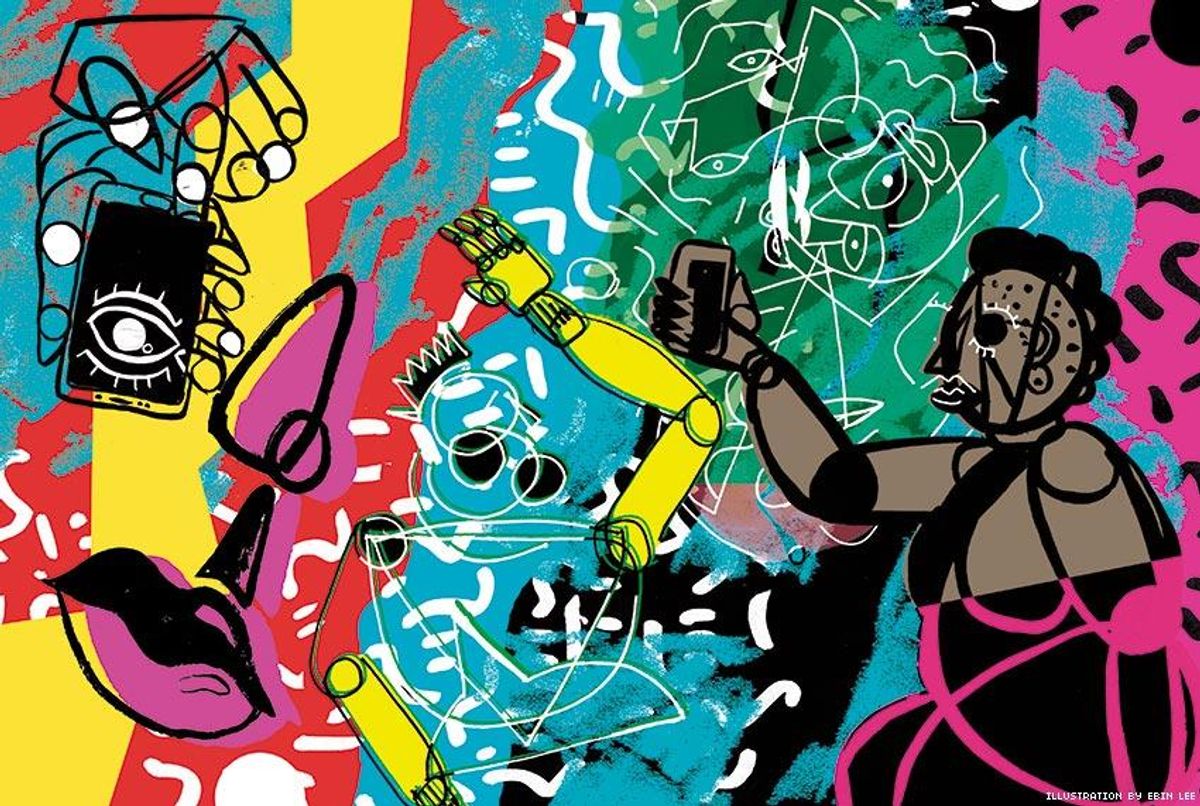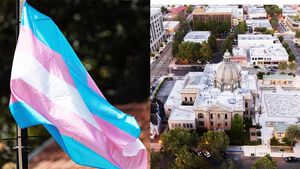There's a revolution going on. A revolution of thought, self-expression, and self-actualization. As a society, we have begun to confront the way we talk about identity, whether it be in terms of race, gender, or sexual orientation. Queer people of color, as an integral voice in this conversation, have often had no choice but to confront -- and be confronted about -- their identities. For the first time since perhaps the Harlem Renaissance, the souls of queer black folk have been depicted on our own terms as we take control of our narratives -- but nearly 100 years on, we have earned the freedom to be far more open and honest than Langston Hughes, Zora Neale Hurston, or Countee Cullen ever could. This is the new renaissance.
"We are in a moment right now where as black people we are increasingly unapologetic about demanding the power and respect that we deserve -- and it's black queer people that are leading the way," explains educator and advocate Danielle Moodie-Mills, who, with her wife, Aisha, hosts the political radio show Politini on blis.fm.
"We have traditionally been the most marginalized group living at the intersection of racial justice and LGBT equality. It's this perspective on how various systems work to dehumanize us that has made us the natural crusaders for justice that many of us are."
Social media has thrown back the veil that separated the seen and unseen, the heard and unheard, empowering a generation decreasingly defined by gender and sexuality but still oppressed by expectations and limitations of race.
"When you grow up without seeing yourself in the culture or in your family, it can really give you the impression from the earliest age that you fundamentally don't belong there," says award-winning filmmaker Justin Simien. "In childhood we associate these identities deeply with our core of being, and some of us never quite get over the sense that we are crashing a party we were never invited to."
Simien's 2014 film Dear White People spoke eloquently to the isolation one feels as a double minority. Yet, thanks to the Internet, that feeling of being "the other" is disappearing. Connections across the country, across the globe, are easily made -- and movements started -- over social media. Alicia Garza and Patrisse Cullors, two writers and queer women of color who bonded over their shared dismay at the Trayvon Martin trial verdict, crystallized the feelings of a nation in the hashtag they co-created: #BlackLivesMatter.
"The Internet and online social networks have been the spaces where queer voices are heard and our narratives are shared far and wide," says Tiq Milan, a writer, speaker, and transgender equality advocate, who, with his wife, Kim, has put a face to finding love in the black trans community.
"Having access to creating our own media has given us a platform to be visible and included in the many discourses we're having. We have refused to remain unseen."
While the Internet has contributed greatly to the visibility of queer people of color, more mainstream, traditional forms of media have also started taking notice, though Simien is wary of the sudden attention.
"Even white people get bored looking at all-white homogeneous casts every once in a while. So, as happens every few years, the culture turns back in on itself and finds a few interesting examples of cultural intersectionality, and for a moment we seem to be everywhere. Not to be overly cynical, but I'm not exactly holding my breath it will last."
One can't blame him for being at least partially skeptical. The march of progress is too frequently hampered by good old-fashioned American obstinacy and reactionaryism. When any marginalized group asserts itself, the ruling class automatically starts weeping for the loss of "values" and "morals" -- code for the perceived loss of their hegemony. Next thing you know, we have Tea Party conservatives, silly and blatantly bigoted anti-trans bathroom bills, and Donald Trump as a viable candidate for president.
So is it outlandish, given the periodic steps backward we take as a society for the sake of "freedom," to think that queer people of color may be easily sidelined, that any power they have carved out for themselves may be unceremoniously stripped? The erosion of one group's rights inevitably leads to the erasure of its very presence and identity.
"When you don't see yourself reflected in any of the media that we consume 24/7, other than when it's documenting violent deaths or steeped in stereotype, it's easy to think we don't exist. It's easy to think we're monsters," Simien says. "I'm here to say we're not."
Whether this wave of visibility does or does not last, another generation is coming of age amid what novelist Darryl Pinckney calls a "sea change in the culture." If you are young, queer, and black, you are more accustomed to seeing yourself within the culture, and growing up with this sense of inclusivity, you will take it not only for granted but as a fact and as a right. You will not be silenced, you will not be ignored, you will not be erased, because that is not your experience. Nor is it the experience of your peers, regardless of their race or how they identify.
"Young people just declared the whole gender-inequality business and persecution-because-of-sexual-orientation thing not a part of what they were about," says Pinckney, whose latest novel, Black Deutschland, follows a young black gay man who escapes America -- and all the baggage he associates with it -- to chase his dreams of an expatriate existence in Berlin.
The black disillusionment with America has led many to attempt to escape this land they can scarcely call home in the hopes of being treated like a human being. And while racism isn't solely an American value, it does seem almost like a tradition here. Something time-honored and passed down from generation to generation like grandmother's jewels. Racism is in the very foundation of this country; it is in the melting pot Lady Liberty uses to stir the tired, the poor, the huddled masses.
"Europe has what we do not have yet," James Baldwin, the most famous black gay expat, wrote in 1961, "a sense of the mysterious and inexorable limits of life, a sense, in a word, of tragedy. And we have what they sorely need: a sense of life's possibilities."
It was in Europe that Baldwin and other black queer artists such as Josephine Baker found the freedom to find themselves, away from the institutionalized racism of a nation that saw, and still sees, them as black first and everything else second. Coupled with the stigma of a queer identity, the pressure can be suffocating.
"I've seen too many brilliant peers' dreams crumble under the weight of that kind of insecurity," Simien says. "It's one of the reasons telling stories and raising up questions and characters to the culture is so important to me."
This pressure -- to conform, to hide, to escape -- comes both from society at large and from within the black and LGBT communities. Somehow you're not black enough or not gay enough, or too black or too gay, based on the expectations those titles confer upon the individual bearing them. The American problem, for anyone who is not a white man of means, but particularly for the most vulnerable populations, is a lack of privilege eclipsing, as Baldwin puts it, the sense of life's possibilities. Then power -- the ability to transcend this problem -- comes not from seizing privilege but from realizing those possibilities regardless of privilege. It comes from shirking the labels bestowed upon you because of the color of your skin or the person you love.
"The conversations about race in this country have become less about black people recreating the same power structures as white people and more about equity," Milan says. "It's more about the specific needs of the community, not about accessing power and privilege the same way white men have."
To survive as a queer person of color in this country has always been a miracle, but to thrive as we have done in recent years is nothing short of revolutionary. That this revolution has largely been perpetrated by writers and artists fulfills the promise of those all-too-brief years during the 1920s in Harlem. The key difference is you don't have to be a Hughes, a Hurston, a Cullen, or a Baldwin to be heard. Whereas once you had to be among the most brilliant to be recognized by the mainstream, social media now allows for the circumvention of the mainstream so that everyone with an opinion can join the conversation, thus propelling it forward. Power is found in this representation -- and also in the audacity to stand up to authority and speak truth to the power seeking to deny your own. It is in the fight for the preservation of black bodies, and it is in the ability to galvanize others in the same fight. This is the new revolution; this is the new renaissance.
"What we face is a system of oppressions designed to ensure our demise. This is not news," says Moodie-Mills. "What is new, however, is a rekindled fire in us that is not just calling for change but demanding it. We are marching, tweeting, sitting in, and opting out. The revolution is unfolding right now, and we are at the helm.
"How do we overcome? We continue to fight for justice -- we live, we love, and we do it all unapologetically."
Like what you see here? Subscribe and be the first to receive the latest issue of OUT. Subscribe to print here and receive a complimentary digital subscription.




















































































